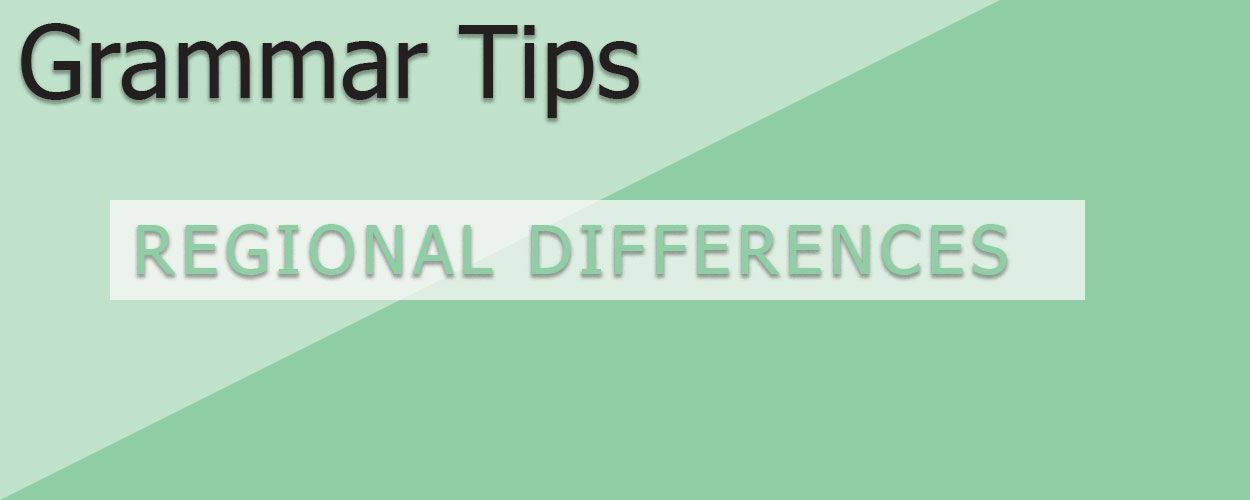

Posted: March 5, 2024
This could also be classified as a spelling error, but seeing as words are not technically misspelled, and for a few other reasons, I decided to place it under grammar instead. Regional differences, in the case of this article, will be used to encompass the use of different dictionaries, but also the use of colloquial terms and region-specific terms.
In English, we have several dictionaries, the most common being for American English and British English. There are also Canadian and Australian (which seem to be a mix of the two). The article below discusses the variants of spelling certain words.
[Related article: Spelling: Dialects]
The article above does not, however, go into detail about region-specific words, such as apartment vs flat, or trunk vs boot, or pants vs trousers. Instead, I’ve compiled a list of excellent resources for this specifically.
When you think about it, it makes sense that different countries would have different words for things, but even within the same country, there are regional differences. These are also called dialects. Within America, there’s the debate between soda, pop, and coke as the generic term for carbonated soft drinks. In Canada, there have been many studies about the varying vocabularies of the regions. Grades vs marks, runners vs running shoes vs sneakers, toque vs hat, and so many more. Check out these articles for more information: Why it’s no surprise that Canadians speak in a range of regional dialects as diverse as any in the world and Yes, Canada has Regional Dialects.
When writing your book, you may be wondering which dictionary to use, and beyond that, which dialect to use. Well, it depends on a few things: where the story takes place, where the book is going to sell, where you (the author) are from, and where the characters are from.
If your story takes place in America, you’ll want to use American spelling and terms. You would then choose the regional terms based on the region in America your story will take place. East Coast vs West Coast, North vs South, and so on. It’s a subtle difference, but one that native speakers are likely to pick up on.
There are some exceptions to this rule, such as in Cassandra Clare’s series The Infernal Devices in which she uses American English despite the story being set in Victorian London. This could be for any number of reasons: the author is American, the book is most popular in America, the main character (whose perspective the story is from) is from America. All of these are good reasons for why the author chose to use American English instead of British English.
If American markets are your main target (most likely you are from America or Canada), you’ll want to use American spelling. One big reason for this is that some Americans, unfortunately, have so much patriotism that they believe any other spelling is incorrect. One author actually got a bad review on their book because the word “favourite” was spelt with a “u,” and they thought the book was filled with typos.
Luckily, Canadian readers are typically more flexible about reading American English (as a lot of content comes from America) and are likely not to comment on a book using American English, even if the author is Canadian. I’m not sure about British readers, but I’ve never known one to complain about something as small as regional spelling differences (stereotypically, they’re too polite for that).
Please note that even if you’re using American spelling for your book, the regional vocabulary should still reflect the setting of the story. Unless, of course, you’re “translating” the book from one region to another (see Harry Potter and the Philosopher’s Stone, in which baby Dudley uses the word “shan’t!” whereas in Harry Potter and the Sorcerer’s Stone (the American version) has Dudley saying “won’t!” and other subtle changes). This typically only happens for books switching from British to American, as Canadian vocabulary takes a lot after American, and Australian vocabulary is considered “exotic” enough by American readers that they tend to enjoy the differences to “set the tone” of the story.
Staying true to the dictionary you grew up learning also makes a lot of sense, readers be damned, because it shows a loyalty to your home country, but I’ve known many Canadian authors who use American English for reasons mentioned above (and I’ve never known an American author to switch to Canadian or even British spelling unless their book very specifically takes place in one of those countries).
This consideration is for vocabulary rather than the dictionary used. If a character has grown up in the same region that the story is taking place, no worries then. You can use the same words in narration as in their dialogue. However, if a character has grown up in a different region, logic dictates that they would use different terms for at least a few things. It’s something natural that they likely wouldn’t even realize. This one is tricky to get right because you may not even know the words that have a difference—which is where extensive research is needed and appreciated.
Aaron, J.E. & Morrison, A. The Little, Brown Compact Handbook, 5th Canadian ed. Pearson, 2013, chap 5
Tigerpetal Press is a small book press dedicated to publishing local authors and poets.